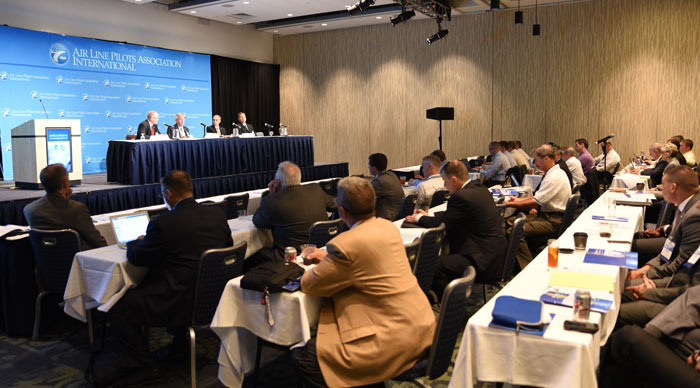Aviation Security
By Capt. Wolfgang Koch (Delta), Air Safety Organization Aviation Security Chairman

ALPA’s Aviation Security Forum, held in conjunction with the Air Safety Forum, hosts panels on topics ranging from international travel to the Federal Flight Officer program.
During last year’s Security Council meeting, the topic of “active shooter” was front and center as shootings had occurred at Fort Lauderdale–Hollywood International, John F. Kennedy International, Los Angeles International, and McCarran International Airports. The Transportation Security Administration (TSA), through the Department of Homeland Security’s Public Area Security Working Group, had also been addressing the need to do more to protect the “soft side” of the airport environment. As more of these situations are likely to occur in the future, it’s paramount that we learn from past incidents to protect ourselves and the traveling public.
As a result, this year’s council initiatives will include a training course in active shooter and violence dynamics. We’re busy working on the next in a series of ALPA’s “Street Smarts” videos that will promote a better understanding of what it means for pilots to be in the middle of an active-shooter scenario and what expectations others at an airport may have of us as pilots and leaders.
On the screening front, the Security Council continues to hear from pilot members regarding the mishandling of security checkpoint screening events. Known Crewmember (KCM) has been an invaluable tool to our pilots and to the TSA, but we still encounter random or secondary-screening events that lead to unexpected challenges for pilots commuting to and from work. ALPA continues to work with the TSA to resolve issues that arise from the KCM screening process.
Along with KCM screening, the TSA has implemented enhanced accessible property screening (EAPS) to screen all passengers, including crewmembers, who transit security checkpoints. ALPA is working with the TSA to ensure that EAPS won’t have a negative impact on how crewmembers are screened.
EAPS was instituted by the federal government because of security threats against aviation. This screening process was first tested at seven major airports and required those transiting screening areas to remove from their bags electronic items larger than a cell phone. EAPS also requires passengers to remove any items that could obscure X-ray imaging. Typical items that crewmembers carry, including food, could hinder X-ray imaging and reading.
The TSA is in the process of instituting this screening standard at all airports across the country, and crews may be directed to remove such items from their carry-ons. ALPA has begun a dialogue with the TSA to provide full crew exemptions at all EAPS screening checkpoints.
Another Security Council initiative is a new Aviation Security Incident Reporting System. We’re compiling security-related incidents, redacted as necessary, into a database to be shared among aviation security entities. If a crew from one airline reports an assault at a layover hotel, or any other type of security threat, these reports will be available to all ALPA pilot group security coordinators to pass on to their respective pilots. We’re now in the final stages of getting this system up and running.
Unmanned aircraft systems (UAS) and cybersecurity initiatives are being addressed through the active participation of our security coordinators. Capt. Jonathan Fowler (Envoy Air) is a member of the UAS team, and Capt. Brian Hoffman (FedEx Express) is working on cyber protections aboard aircraft. The council is working with other disciplines within the ASO to address UAS and cybersecurity issues.
Regarding the Federal Flight Deck Officer (FFDO) program, Capt. Darrin Dorn (Alaska), ALPA’s Aviation Security vice chair, has discussed a new senior-level training initiative with TSA FFDO leaders. He’s been working closely with the TSA’s Federal Air Marshal training program managers to develop an advanced training course for senior-level FFDOs. We’ve been working with the TSA to improve FFDO training so that officers continue to stay active in the program.
ALPA’s Aviation Security structure will continue to push for these and other security priorities that keep our pilots, passengers, and cargo secure and our skies safe from those who intend to do us harm.

